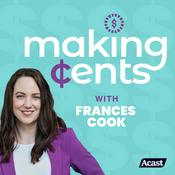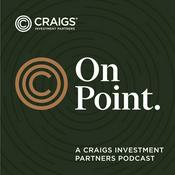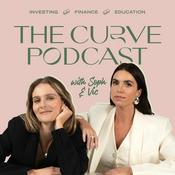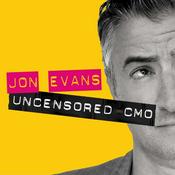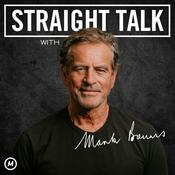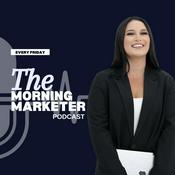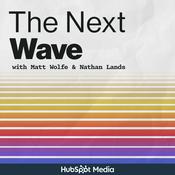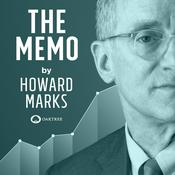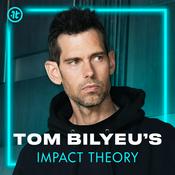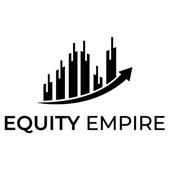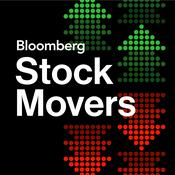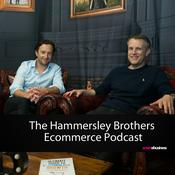45 episodes
- We explore six Christmas wishes for the year ahead - and each one gives you something to think about as you step into 2026 with intention.
Performance management - we challenge the language we use and frame performance in a fresh way that you can apply immediately.
Pay transparency - the real opportunity we can leverage from the EU directive.
AI in the workplace - Gemma shares her biggest concern, when it comes to people and culture, and what to do about it
Total EVP – Gemma's new term, a build on Total Reward, that goes beyond reward and what intrinsic motivators like mastery and purpose have to do with talent attraction and retention.
Leadership – find out how we relate surfing to the leadership skills we need in 2026
HR as a culture-shaper - the hill Gemma will die on. Why the future HR function must lead, not react.
Grab a festive drink and join us for a cozy and candid chat.
Merry Christmas from us to you! 🎄✨
Thank you for tuning in to this episode of The Strategic Leader podcast. If you enjoyed the show, please give us 5 stars! It will help others to find the show. And don't forget to check out previous episodes, and subscribe for more insightful discussions and practical advice on becoming a more naturally strategic leader.
If you have questions about anything we've been talking about, or need guidance on strategic leadership, we'd love to hear from you.
Feel free to contact us via www.gemmabullivant.co.uk (Gemma) or www.wearegoodthinking.co.uk (Fiona). Your queries could inspire future episodes to help you become a more strategic leader. - Is being ‘nice’ at work doing more harm than good?
Many of us equate niceness with being a good leader. But we suggest that when we soften messages, it is more about avoiding discomfort and tiptoeing around conflict.
We explore why ‘being nice’ can often lead to unclear expectations, unspoken issues, and missed opportunities for growth, both for individuals and the organisation as a whole.
Instead of chasing niceness, we suggest aiming for kindness, which requires clarity, courage, and putting the other person’s development above your own comfort.
Drawing on Kim Scott’s Radical Candor model, we discuss how to balance care with challenge, how to give feedback that lands, and why 15 seconds of discomfort is often all it takes to make a real difference.
If you're leading a team or shaping culture, this episode will help you understand why niceness can get in the way of effective leadership, and what to do instead.
We offer practical tips for building a feedback culture, reframing discomfort, and communicating with compassion and courage.
Key points discussed
The difference between being ‘nice’ and being kind
Why discomfort often signals a moment of real leadership
The Radical Candor model: care personally, challenge directly
Why giving feedback isn’t about you - it’s about their growth
How to normalise feedback through culture and habit
Top tips for handling courageous conversations effectively
Key takeaway
Being nice can feel safe, but it often masks avoidance. True kindness means stepping into discomfort, offering clarity, and prioritising growth over harmony.
Courageous conversations aren’t easy - but they are essential.
Thank you for tuning into this episode of The Strategic Leader podcast.
If you enjoyed the show, please give is 5 stars! It will help others find the show.Check out our previous episodes and remember to subscribe so you don’t miss our future shows.
If you have any questions or want to discuss anything, we’d love to hear from you:
www.gemmabullivant.co.uk (for Gemma)
www.wearegoodthinking.co.uk (for Fi) 4.09 Why are there still so few women in senior leadership? with Geraldine Gallacher
02/9/2025 | 35 mins.If you’re wondering why the number of women in senior roles remains low despite all the progress we think we’ve made, this episode unpacks what’s really going on beneath the surface.
We talk to Geraldine Gallacher - CEO, coach, author and president of the City Women’s Network - about the deep-rooted systems that continue to hold women back in leadership. She shares her wealth of knowledge, and explains the causes she sees as key to understand and address - systemic bias, cultural norms and unspoken expectations.
We explore how leadership still tends to favour agentic qualities like dominance and decisiveness, generally associated with men, and often sidelines qualities more valued by employees, such as collaborative and inclusive behaviours.
We also talk about how women are judged more harshly for the same behaviours that are seen as strong in men, and why many women struggle to find visible role models who lead in a way they can relate to.
Geraldine shares some practical points, to help organisations continue to address this ongoing challenge.
Key Points Discussed
Leadership is still widely associated with agentic rather than collaborative styles
Many women blame themselves for a lack of progress rather than recognising systemic bias
Flexible working policies exist but workplace culture has not caught up
Young women may not notice bias until they are more advanced in their careers
There is still a lack of relatable female role models in leadership
Men are also penalised when they deviate from traditional norms, especially in parenting
Women’s development programmes can help open eyes to what is systemic rather than personal
Key Takeaway
The issue is not with women. It is with the structures that still reward one narrow idea of leadership. Until organisations stop gendering leadership traits and take systemic action, progress will remain stuck.
If you liked this, you might like these related episodes:
S4 07 - How to be a More Strategic HR Leader?
S2 08 - The Key to Confident Leadership
S2 01 -Overcoming Imposter Syndrome
About Geraldine Gallacher
Geraldine is a pioneer in coaching setting up The Executive Coaching Consultancy in 1994 and qualifying as a Master Coach with the Association of Coaching early in its inception.
In 2005 she had something of an epiphany when she started to question why she was coaching so many men and not women. This led to her writing her book Coaching Women, Changing the System not the Person and launching her own podcast Shifting the Needle where the needle she’s referring to is the number of women leaders in business.
Thank you for tuning into this episode of The Strategic Leader podcast.
If you enjoyed the show, please give is 5 stars! It will help others find the show. Check out our previous episodes and remember to subscribe so you don’t miss our future shows.
If you have any questions or want to discuss anything, we’d love to hear from you:
www.gemmabullivant.co.uk (for Gemma)
www.wearegoodthinking.co.uk (for Fi)- Pay transparency is no longer just a nice-to-have. We explore why it’s fast becoming a legal and cultural expectation.
We talk about the EU Pay Transparency Directive, what it requires, and why even UK-based organisations can’t ignore it.
Gemma explains the four core areas of the directive: recruitment transparency, clear pay structures and progression criteria, employees’ new rights to pay information, and enhanced gender pay gap reporting requirements.
You will learn why simply publishing salaries isn’t enough. You’ll need robust job architecture, fair progression frameworks, and the ability to explain pay decisions in clear, accessible terms. We discuss how greater transparency can strengthen trust, but also the risks if outliers and inconsistencies aren’t identified and addressed.
You’ll leave with practical steps to assess your organisation’s readiness, from putting salaries in job ads to internal pay equity reviews, plus a roadmap for compliance by June 2026.
Whether you have EU-based employees or not, market shifts mean transparency will soon be the norm.
Key points discussed
Why the EU Pay Transparency Directive matters beyond the EU
Four core requirements: recruitment transparency, pay structures, employee pay rights, detailed reporting
How cultural expectations are shifting towards greater pay transparency
Risks of ignoring preparation, including outliers and employee dissatisfaction
Importance of job architecture and clear progression criteria
Practical resources for June 2026 compliance
Key takeaway
Pay transparency isn’t just about putting pay ranges in job ads. It requires solid structures, clear processes, and cultural readiness. Acting now will protect trust, compliance, and competitive hiring strength.
For a deeper dive, download Gemma’s free Readiness Checklist and EU Pay Transparency Guide.
And if you liked this episode, try:
S4.02 – Are performance ratings still fit for purpose?
S4.03 – Is it time to redefine performance?
Guide – How to link pay to performance
Thank you for tuning into this episode of The Strategic Leader podcast.
If you enjoyed the show, please give is 5 stars! It will help others find the show. Check out our previous episodes and remember to subscribe so you don’t miss our future shows.
If you have any questions or want to discuss anything, we’d love to hear from you:
www.gemmabullivant.co.uk (for Gemma)
www.wearegoodthinking.co.uk (for Fi) - Tired of being told to “be more strategic” with no real guidance on what that means?
Chief People Officer Indy Lachhar shares her real-world perspective on how HR can think and act more strategically without relying on textbook definitions or theory.
She reframes strategy as a daily mindset, focusing on staying aligned to the real goals of the business, building trusted relationships, and focusing on the few things that really drive value. This last one involves getting better at saying no.
We explore how asking better questions, not jumping to solutions, and holding firm on what matters helps HR shift from task delivery to value creation. Indy also shares her weekly reflection habit, how she approaches saying no, and the shift from delivering initiatives to shaping impact.
If you're in HR and want to feel more confident and focused and operate with more impact, this conversation covers helpful tips and techniques to ask great questions and adopt a strategic mindset.
Key Points Discussed
Strategy starts with aligning people work to business outcomes, not building plans
HR must listen well, and ask better questions to uncover what really matters
Relationships are the foundation of strategic influence
Focus on 3–5 things that truly drive value, not long to-do lists
HR's unique visibility gives it powerful insight into what drives performance
Strategic clarity often means saying no to the wrong work
Reflection helps you show up with purpose and intention each week
Key Takeaway
Being strategic in HR isn’t about theory or a one-off activity. It’s a daily habit about aligning with business goals, listening with intent, asking better questions, and choosing what truly creates value.
If you liked this, you might like these related episodes:
S4 01 - What does it mean to think strategically at work?
S1 10 - How to align your strategy to business goals
S1 07 -Taking HR from Reactive to Transformational
About Indy Lachhar
Indy Lachhar is Chief People Officer at Robert Walters Group, where she leads the global people strategy and a team of 140 HR professionals across 30 markets. With a strong track record in leadership development, organisational culture and talent transformation, she champions a people-first approach grounded in authenticity, care and entrepreneurial spirit.
Indy has held senior HR roles across the Group, shaping initiatives that embed inclusive leadership, psychological safety and long-term talent development. She brings a strategic lens to the CPO role, aligning people practices with business growth while elevating HR as a critical partner in driving organisational success.
Thank you for tuning into this episode of The Strategic Leader podcast.
If you enjoyed the show, please give is 5 stars! It will help others find the show.Check out our previous episodes and remember to subscribe so you don’t miss our future shows.
If you have any questions or want to discuss anything, we’d love to hear from you:
www.gemmabullivant.co.uk (for Gemma)
www.wearegoodthinking.co.uk (for Fi)
More Business podcasts
Trending Business podcasts
About The Strategic Leader
The Strategic Leader is a podcast for busy leaders to learn how to be naturally strategic, so that you can operate with impact and sit at the top table with confidence, with clear and actionable tips to demystify strategy and help you to succeed. With your hosts Gemma Bullivant, Executive Coach and Strategic HR Consultant, and Fiona Craig, strategist, founder and coaching lead at Good Thinking.
Listen to The Strategic Leader, The Ramsey Show and many other podcasts from around the world with the radio.net app
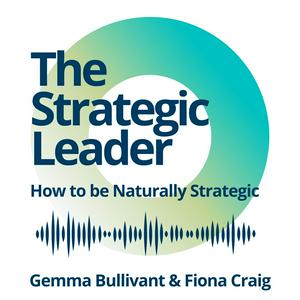
Get the free radio.net app
- Stations and podcasts to bookmark
- Stream via Wi-Fi or Bluetooth
- Supports Carplay & Android Auto
- Many other app features
Get the free radio.net app
- Stations and podcasts to bookmark
- Stream via Wi-Fi or Bluetooth
- Supports Carplay & Android Auto
- Many other app features


The Strategic Leader
Scan code,
download the app,
start listening.
download the app,
start listening.



